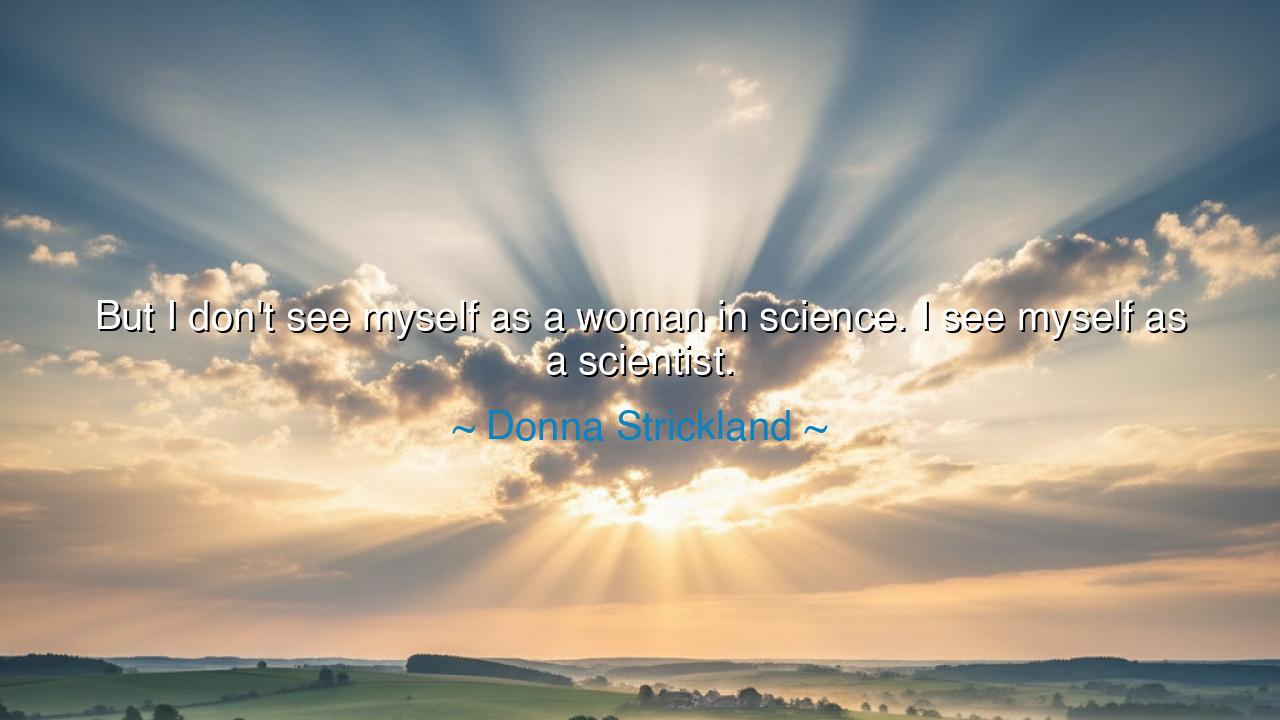
But I don't see myself as a woman in science. I see myself as a






"But I don't see myself as a woman in science. I see myself as a scientist." These powerful words, spoken by Donna Strickland, echo across the ages like a clarion call, challenging the boundaries that separate the true seeker of knowledge from the labels society often seeks to impose. Strickland’s assertion does not diminish her identity as a woman, but rather elevates her profession—reminding us all that science, in its purest form, is not defined by gender, race, or any other characteristic but by curiosity, intellect, and a relentless pursuit of truth. It is a reminder that scientists—in the truest sense—are driven not by external distinctions, but by an inner calling to understand and explore the very fabric of existence.
In the ancient world, the philosopher Aristotle was revered not for his birth or station, but for his ability to question and understand the natural world. His insights were a gift to humanity, free of labels. The great minds of antiquity were not celebrated for the identities they carried but for the wisdom they brought forth. Pythagoras, Galileo, Newton, and others were not seen as this or that; they were seen as seekers of knowledge, pioneers on paths that others dared not tread. So it is with Strickland’s words—she, too, sees herself not through the lens of gender but through the lens of science, where her worth and identity are shaped by her contributions to the pursuit of truth.
Consider the story of Marie Curie, the brilliant physicist who discovered radioactivity and became the first woman to win a Nobel Prize. She, too, did not see herself as a woman in science, but as a scientist. Her work transcended the bounds of her gender; she was driven by an unyielding passion for discovery, and it was this relentless drive that led her to change the world. Curie faced not only the challenges of being a woman in a male-dominated field but also the personal sacrifices that come with the pursuit of knowledge. Yet, she did not define herself by these challenges. She was a scientist, and it was through her work that her legacy would be written in the annals of history.
Strickland’s words also call to mind the stories of countless unsung heroes who have shaped the course of history not through their gender, but through their brilliance and dedication. The first women to contribute to fields like mathematics, astronomy, and engineering were often invisible, their names erased from the history books. Yet their contributions laid the foundation for the modern world. They were scientists, not defined by the labels society sought to impose but by their unwavering commitment to understanding the mysteries of the universe. Like Strickland, they too saw themselves not as women in science, but simply as scientists, driven by a profound love for discovery.
The true lesson of Strickland’s statement is one of identity and empowerment. In a world that often seeks to categorize and limit, it is vital to recognize that knowledge and inquiry know no boundaries. The pursuit of science, the hunger for truth, the thirst for understanding, are not bound by the shape of one's body or the color of one's skin. The great scientists of history have been defined by their ideas, not by their personal characteristics. In the same way, Donna Strickland calls upon all of us to transcend the limiting labels imposed by the world and to see ourselves for what we truly are—explorers of knowledge, seekers of truth, creators of change.
In our own lives, we must not allow ourselves to be defined by external forces or the labels that others may impose upon us. Whether in science or any other field, we must recognize that our value comes not from what society says we can or cannot do, but from our commitment to our craft, our dedication to our work, and our passion for what we love. Let us look at ourselves and the world not through the narrow lens of limitation, but through the expansive lens of possibility—where we, too, can be scientists, artists, philosophers, and leaders, defined only by our ability to create, to discover, and to impact the world around us.
So let Strickland’s words serve as a guide for all who seek to define themselves by their actions rather than their identities. The world is shaped not by the titles we wear, but by the work we do, the ideas we share, and the change we bring. Science, like all knowledge, is a universal endeavor, one that calls us to push beyond the labels and embrace the deeper calling to create, explore, and understand. May we all find the courage to see ourselves as creators in our fields, and may we inspire the next generation to do the same.






AAdministratorAdministrator
Welcome, honored guests. Please leave a comment, we will respond soon